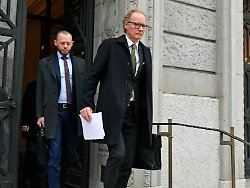Wednesday, December 8th, 2021
German lawyer charged
Judge breaks off the trial of Cum-Ex scouts
The Swiss public prosecutor wants to put a German lawyer in jail for uncovering crimes in connection with cum-ex deals. But there is a surprise in court. The process breaks – because of bias on the part of the public prosecutor.
In the processing of fraudulent cum-ex tax transactions, there is an abrupt turn in the newly opened process for industrial espionage against the German lawyer and scout Eckart Seith. The higher court in Zurich granted the defense counsel’s applications and broke off the appeal hearing. Judge Rolf Naef said the results of the investigation by a public prosecutor who had previously dealt with the case could not be used due to bias.
The defense lawyers had pleaded several times in the eight-year investigation, but so far in vain. They argued that the prosecutor was busy simultaneously with a lawsuit against Bank J. Safra Sarasin and with a counterclaim by the bank against the defendants. But he only collected evidence against the defendants, not the bank. The court thus lacked the basis for the process. A final decision on the progress of the process was still pending.
The indictment was related to one of the biggest tax scandals of the post-war period. This involves fraudulent cum-ex deals, in which investment funds can only be reimbursed several times for taxes that have only been paid once.
Since then, a German customer of the Swiss bank J. Safra Sarasin, who lost a lot of money through cum-ex deals brokered by the bank, had fought for damages in Ulm. In the process, he presented internal bank documents that triggered extensive cum-ex investigations in Germany. However, the Swiss public prosecutor saw industrial espionage in the delivery of the documents and had in turn charged Seith and two former employees of the bank.
Since then, the accusation of industrial espionage had been acquitted in a first trial in 2019. But it remained a guilty verdict for offenses against the banking law. The two bank employees were also found guilty. Both the public prosecutor and the defendants had appealed.
